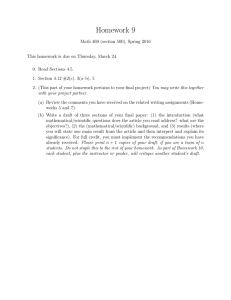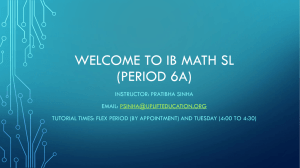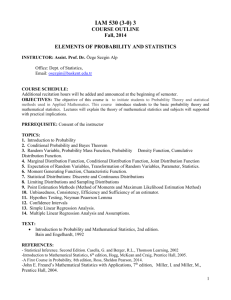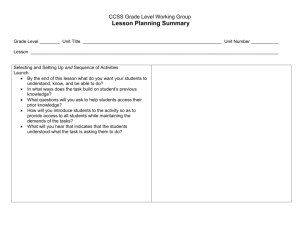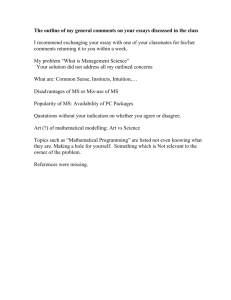Page 1 of 4 Philadelphia University Faculty of Science
advertisement
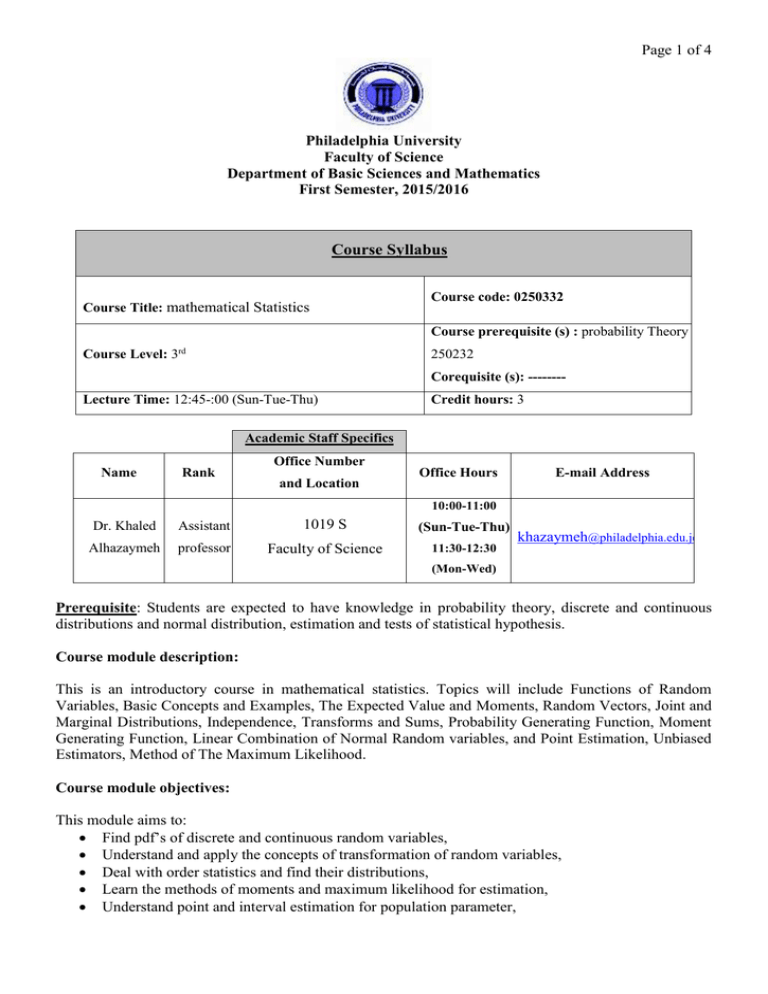
Page 1 of 4 Philadelphia University Faculty of Science Department of Basic Sciences and Mathematics First Semester, 2015/2016 Course Syllabus Course Title: mathematical Statistics Course code: 0250332 Course prerequisite (s) : probability Theory rd Course Level: 3 250232 Corequisite (s): -------- Lecture Time: 12:45-:00 (Sun-Tue-Thu) Credit hours: 3 Academic Staff Specifics Name Rank Office Number and Location Office Hours E-mail Address 10:00-11:00 Dr. Khaled Assistant 1019 S (Sun-Tue-Thu) Alhazaymeh professor Faculty of Science 11:30-12:30 khazaymeh@philadelphia.edu.jo (Mon-Wed) Prerequisite: Students are expected to have knowledge in probability theory, discrete and continuous distributions and normal distribution, estimation and tests of statistical hypothesis. Course module description: This is an introductory course in mathematical statistics. Topics will include Functions of Random Variables, Basic Concepts and Examples, The Expected Value and Moments, Random Vectors, Joint and Marginal Distributions, Independence, Transforms and Sums, Probability Generating Function, Moment Generating Function, Linear Combination of Normal Random variables, and Point Estimation, Unbiased Estimators, Method of The Maximum Likelihood. Course module objectives: This module aims to: Find pdf’s of discrete and continuous random variables, Understand and apply the concepts of transformation of random variables, Deal with order statistics and find their distributions, Learn the methods of moments and maximum likelihood for estimation, Understand point and interval estimation for population parameter, Page 2 of 4 Test hypotheses about population parameters, Understand the mathematics needed in statistical methods. Course/ module components Title: “Introduction to Mathematical Statistics”. Author(s)/Editor(s): Paul G. Hoel. Publisher: John Wiley & Sons, Inc. Edition: 5th Edition. Year: 1984. ISBN: 0-13-129382-6. Teaching methods: Duration: 16 weeks, 48 hours in total. Lectures: 48 hours, 3 per week + two exams (two hours). Assignments: 3 quizzes. Learning outcomes: Knowledge and understanding 1. To give the student the necessary information to deals with mathematical statistic problems. 2. To give the student the necessary mathematical statistic tools for further study in pure mathematics. 3. To demonstrate the ability of using mathematical statistic in solving statistic problems. Cognitive skills (thinking and analysis). 1. To identify and solve problems. Work with given information and handle mathematical statistic proofs based on mathematical statistic theorems. Communication skills (personal and academic). 4. Display personal responsibility by working to multiple deadlines in complex activities. 5. Be able to work effectively alone or as a member of a small group working on some tasks. 6. Encourage the students to be self-starters (creativity, decisiveness, initiative) and to finish the mathematical problems properly (flexibility, adaptability). Also to improve general performance of students through the interaction with each other in solving different mathematical problems. Practical and subject specific skills (Transferable Skills). 1. Gaining knowledge and experience of working with many pure mathematical problems. Assessment instruments Allocation of Marks Assessment Instruments Mark First examination 20% Second examination 20% Final examination 40% Quizzes, Home works 20% Total 100% * Make-up exams will be offered for valid reasons only with consent of the Dean. Make-up exams may be different from regular exams in content and format. Page 3 of 4 Course/module academic calendar week (1-4) Basic and support material to be covered Functions of random variables: Basic concepts, some examples, of discrete and continuous cases. Invertible functions of continuous random variables. Expected values for functions of random variables. The kth moment of X, variance, the Normal distribution. (5-8) First exam Random Vectors: Basic concepts, definition, joint distributions Discrete and continuous distributions. Marginal distributions. Functions of random vectors. Independent random variables. Expectation and random vectors. Conditional distributions. (9-12) Second exam Transforms and Sums: Notation. Probability generating function (p.g . f ). Moment generating function (m.g . f .). Linear combination of normal random variable. The distribution of sample mean. Homework, Reports and their due dates Quiz 1 Quiz 2 (13-14) (15) (16) Estimation: Basic concepts. Random samples. Statistics. Point estimation, unbiased estimators, finding estimators. The method of maximum likelihood. Review. Final Examination. Expected workload: On average students need to spend 3 hours of study and preparation for each 50-minute lecture/tutorial. Attendance policy: Absence from lectures and/or tutorials shall not exceed 15%. Students who exceed the 15% limit without a medical or emergency excuse acceptable to and approved by the Dean of the relevant college/faculty shall not be allowed to take the final examination and shall receive a mark of zero for the Page 4 of 4 course. If the excuse is approved by the Dean, the student shall be considered to have withdrawn from the course. Module references Students will be expected to give the same attention to these references as given to the Module textbooks. Additional Books 1. Malik, S. C., and Savita Arora. Mathematical analysis. New Age International, 1992. 2. Stromberg, Karl R. An introduction to classical real analysis. 1981.
